Key Takeaways
Wego’s success lies in its smart integration of metasearch technology, real-time updates, and localized experience tailored to global travelers.
Building a travel booking app like Wego requires a solid tech foundation, intuitive design, and features like AI personalization and blockchain security.
Emerging technologies such as AI, ML, and blockchain are redefining travel booking by improving accuracy, personalization, and transaction transparency.
Cost factors depend on design complexity, tech stack, and desired features, choosing the right development partner can optimize both budget and performance.
Partnering with JPLoft ensures expert guidance, innovative development, and reliable support to turn your travel app vision into a successful digital platform.
In today’s digital-first travel landscape, apps like Wego have transformed how travelers search, compare, and book trips, all from a single interface. From real-time flight comparisons to hotel deals across platforms, Wego has set a benchmark for seamless and smart travel planning.
If you’re looking to create a travel booking app like Wego, understanding what makes it so successful is key. This guide walks you through everything, from features and tech stack to cost and challenges, so you can confidently start your journey to build a travel booking platform that attracts, engages, and converts modern travelers.
All About Wego App
Wego has transformed how travelers search, compare, and book flights, hotels, and holiday packages worldwide. Acting as a global travel metasearch engine, it pulls real-time data from numerous online travel agencies (OTAs) to help users discover the most affordable and convenient options, all in one place.
Wego’s success lies in its blend of intelligent technology, localization, and user-first design, which makes it one of the best travel apps globally, trusted by millions of travelers.
1. Key Highlights of Wego
-
Comprehensive Search Ecosystem: Aggregates data from airlines, hotels, and tour providers for easy, one-tap comparison.
-
Localized Experience: Supports multiple languages and currencies, tailoring search results to each user’s region.
-
Real-Time Price Tracking: Provides up-to-the-minute airfare and hotel pricing so users never miss a deal.
-
Smart Filters & Predictive Search: Uses AI to understand traveler intent and recommend results that best match preferences.
-
Seamless Booking Journey: Prioritizes fast navigation and minimal steps from discovery to checkout.
-
Revenue Model: Operates mainly on affiliate commissions and CPC (Cost-Per-Click) from partner airlines, hotels, and travel portals.
-
Strong Partnerships: Integrates with trusted industry leaders like Expedia, Booking.com, and Agoda to deliver accurate and up-to-date travel listings.
2. Technology & Design Backbone
The platform’s strength lies in its API-driven infrastructure, AI-powered personalization, and geo-aware content delivery, ensuring that users always see the most relevant travel options.
Wego’s UI/UX design emphasizes simplicity, speed, and credibility, reducing friction during searches and boosting conversions. Its adaptive layouts, strong visual hierarchy, and secure payment workflows ensure a flawless experience across devices.
If you plan to make a travel booking app like Wego, focus on combining real-time API integration, personalized recommendations, and secure payments to deliver a world-class booking experience.
By studying Wego’s ecosystem and innovation strategy, you can create a travel app that meets evolving traveler expectations while achieving strong user loyalty.
How Does an App like Wego Work?
Wego simplifies the travel search and booking process by combining multiple services under one digital roof. Here’s a breakdown of how an app like Wego functions behind the scenes:
1. Aggregation of Travel Data
Wego’s platform collects real-time data from hundreds of airline, hotel, and travel agency APIs. This data aggregation ensures users can compare prices, availability, and reviews in one unified interface, saving both time and effort.
To achieve this level of efficiency, many developers aim to develop a travel booking clone like Wego, leveraging robust API integrations and dynamic data synchronization.
2. Search and Filter Mechanism
When a user enters a destination or travel date, Wego’s algorithm instantly fetches and filters results based on user preferences like price, rating, and timing.
This intelligent functionality provides a seamless, personalized experience, something essential if you plan to build a travel clone like Wego that competes in the global travel market.
3. AR-Enhanced User Experience
Modern travel apps are embracing immersive experiences. Incorporating AR in travel apps enables users to preview destinations, visualize hotels, or even navigate airports virtually before traveling. This adds tremendous value to Wego-style platforms, improving engagement and user retention.
4. Booking Integration and Payment Gateway
After selecting their preferred option, users are redirected to partner sites for secure checkout. Integration with reliable payment gateways ensures smooth transactions and builds trust, two critical pillars for any successful booking ecosystem.
For startups exploring how to build an itinerary app, this component highlights the importance of cross-platform integrations and streamlined data handling.
5. Flight and Accommodation Coordination
Wego connects travelers to real-time flight and hotel data, ensuring up-to-date booking availability. It uses caching and machine learning models to predict price changes and availability trends, helping users make informed decisions.
When planning how to create a flight booking app, incorporating similar predictive analytics can enhance competitiveness and user satisfaction.
6. User Profile and Personalization
Wego tailors results using AI and historical search data to recommend trips, hotels, and activities aligned with user preferences. This personalization not only boosts engagement but also drives loyalty, essential for anyone looking to build an app like Wego? and replicate its success.
Features to Include in an App like Wego
A successful travel booking platform like Wego thrives on user convenience, performance, and personalization. If you’re planning to create a travel booking app like Wego, here are the must-have features that define its success.
1] Multi-Mode Search and Comparison
Users expect flexibility to search across flights, hotels, and activities, all in one app. Wego enables multi-search capability with filters for budget, ratings, and timing.
To make a travel app like Wego, focus on fast and accurate search algorithms that deliver precise results within seconds, ensuring travelers find what they need effortlessly.
2] Intuitive UI/UX Design
A clean layout and intuitive navigation play a crucial role in user satisfaction. Simple booking steps, easy filters, and interactive visuals make travelers stay longer.
When analyzing top travel app features, UI/UX consistency stands out as one of the strongest engagement boosters for apps similar to Wego.
3] Smart Recommendations and AI-Powered Suggestions
By using AI and predictive analytics, Wego suggests personalized travel options based on a user’s past behavior and preferences. Implementing such systems can dramatically improve retention rates and conversion potential.
4] Real-Time Price Alerts and Notifications
Wego sends instant notifications when prices drop for tracked routes or hotels. Integrating this feature gives users control and transparency, two factors crucial for brand loyalty.
Developers looking to create a clone like Wego should ensure accurate alert algorithms that fetch real-time updates and automate push notifications.
5] In-App Monetization and Ads
Beyond bookings, Wego generates revenue through sponsored listings, affiliate marketing, and display ads. Strategically applying travel app monetization strategies helps startups balance user experience and profitability.
6] Secure Payments and Multiple Currency Support
Trust is everything in travel apps. Providing safe payment options, diverse currencies, and localized gateways ensures a smooth global user experience.
Those planning to develop a travel booking clone like Wego should integrate SSL (Secure Sockets Layer) encryption, tokenization, and fraud detection APIs.
7] Reviews, Ratings, and Social Proof
Travelers rely heavily on reviews and feedback before booking. Including this feature improves credibility, encourages engagement, and builds community trust.
8] Multilingual and Multi-Currency Support
Expanding reach means catering to diverse audiences. Apps like Wego support multiple languages and currencies to ensure inclusivity and accessibility worldwide.
When exploring how to make an app like Tripadvisor, consider adopting similar globalized features that make your platform usable for travelers across regions.
9] Offline Access and Itinerary Sync
Offline functionality allows users to access saved itineraries, boarding passes, and hotel details without connectivity, enhancing reliability during travel.
Features Summary Table: Key Features of a Travel App like Wego
|
Feature |
Description |
Purpose/Benefit |
|
Multi-Mode Search & Comparison |
Allows users to compare flights, hotels, and rentals from multiple providers in one place. |
Simplifies trip planning and enhances decision-making. |
|
Intuitive UI/UX Design |
Offers a clean layout, easy navigation, and visually engaging interfaces. |
Improves user satisfaction and app retention. |
|
Smart Recommendations (AI-Powered) |
Uses AI and ML to suggest personalized options based on user preferences. |
Increases engagement and conversion rates. |
|
Real-Time Price Alerts |
Sends instant notifications for price changes or discounts. |
Helps users find the best deals quickly. |
|
In-App Monetization & Ads |
Includes ads, affiliate links, and premium listings for brands. |
Generates additional revenue streams. |
|
Secure Payment Gateway |
Integrates encrypted payment systems with multi-currency support. |
Builds trust and ensures safe transactions. |
|
Ratings & Reviews |
Displays verified user feedback and ratings for flights and hotels. |
Builds social proof and influences decisions. |
|
Multilingual Support |
Offers multiple languages and currency options for global users. |
Expands user reach and accessibility. |
|
Offline Access |
Allows itinerary viewing and updates without an internet connection. |
Improves reliability during travel. |
|
Push Notifications |
Sends personalized alerts about bookings, offers, and updates. |
Enhances user engagement and retention. |
Why Build a Travel Booking App like Wego
Building a travel booking app like Wego can be a game-changing opportunity for businesses aiming to enter the digital travel market.
As travelers increasingly prefer mobile-first booking experiences, apps that simplify trip planning and deliver real-time personalization are seeing massive engagement and retention rates. Here’s why it’s worth investing in one:
► Rising Market Demand for Smart Travel Solutions
Global travelers now seek all-in-one platforms that provide flight, hotel, and holiday booking under one roof. The success of apps like Wego, Trip.com, and Skyscanner showcases the demand for seamless, mobile-first ecosystems.
Modern travel apps are leveraging travel app development trends like predictive pricing, AI-based search, and hyper-personalized itineraries to stay ahead in a competitive landscape. These innovations not only attract tech-savvy users but also boost repeat engagement and customer loyalty.
► AI-Driven Personalization and Smarter Assistance
Today’s travelers expect more than just search results; they want smart recommendations, voice-based assistance, and contextual insights. Integrating AI features, like virtual travel assistants, can transform your app into an intelligent companion for users.
By learning how to build an AI travel agent, businesses can automate itinerary creation, suggest budget-optimized trips, and provide real-time updates based on weather or flight delays. This level of automation can significantly elevate user experience and app engagement metrics.
► Enhanced User Trust Through Transparency and Security
With digital transactions and booking data increasing, security has become a top priority. Integrating blockchain technology ensures data integrity, transparent pricing, and safe payments, all vital for travel apps that handle sensitive user details.
Leveraging blockchain in travel apps allows businesses to provide verifiable bookings and reduce fraud risks while maintaining a seamless, trustworthy experience for global travelers.
► Monetization and Long-Term Business Value
A well-built Wego-like app opens multiple revenue opportunities, affiliate commissions, advertising, premium subscriptions, and transaction fees. Combined with a user-centric design and advanced features, it can evolve into a scalable platform that continues to grow as travel rebounds worldwide.
To stay competitive and make a travel booking app like Wego that stands out, integrating AI-driven personalization, blockchain-based payments, and AR-powered experiences can significantly enhance your brand appeal and retention potential.
How to Develop an App like Wego?
Developing a travel booking app like Wego involves a systematic process that blends innovation, design precision, and reliable technology. Each phase, from market research to scaling, plays a crucial role in building an app that users love and trust.
Let’s break it down step-by-step and understand how to develop a travel booking app like Wego effectively.
Step 1: Conduct Market and Competitor Research
Start by analyzing competitors like Wego, Skyscanner, and Kayak to identify what makes them successful. Study audience behaviors, booking preferences, and travel trends across regions. This research helps you identify the exact gap your app can fill.
If you aim to create an app like Wego, align your app’s goals with traveler expectations, focusing on simplicity, transparency, and accessibility. This foundational research ensures your app idea has both market demand and long-term growth potential.
Step 2: Define the App’s Core Features and Goals
Outline your core modules, flight, hotel, and activity booking, multi-currency support, and personalized search filters. Establish your unique value proposition, whether it’s price comparison accuracy or faster booking flow.
This clarity ensures your team understands exactly how to make an app like Wego that meets modern usability standards while leaving room for innovation and advanced features.
Step 3: Choose the Right Tech Stack
Your app’s architecture determines its speed, scalability, and flexibility. Choosing the ideal travel app tech stack is crucial.
Frontend frameworks like Flutter or React Native ensure smooth cross-platform experiences. On the backend, Node.js, Django, or Ruby on Rails offer reliable server-side performance.
Additionally, focus on integrating APIs for booking and pricing data. For instance, Amadeus, Skyscanner, and Sabre APIs provide real-time flight and hotel information, essential if you’re planning to develop a travel app like Wego that delivers accurate, live results.
Step 4: Design the UI/UX
The user interface defines how travelers interact with your app. Keep it simple, with intuitive navigation, engaging visuals, and fast access to search results. When deciding how to design an app like Wego, focus on:
-
Ease of Navigation: Ensure minimal clicks to reach desired results.
-
Visual Consistency: Use attractive icons, color harmony, and responsive layouts.
-
Performance: Optimize load time and reduce friction at every stage.
Collaborating with expert UI/UX design services helps ensure your app’s interface feels effortless, engaging, and conversion-driven across all devices.
Step 5: Build and Test Your MVP
Before going full-scale, develop a Minimum Viable Product (MVP) that contains core features like search, filters, and payments. This approach helps test real user feedback early and validate your product-market fit.
You can later expand the app with advanced features such as itinerary planning or dynamic pricing suggestions. Following an MVP-first approach helps you build an app like Wego faster, smarter, and more efficiently.
Step 6: Focus on Functional Modules and API Integration
Once the MVP succeeds, integrate deeper functionalities such as localization, loyalty programs, and AI-based personalization. APIs are the heart of a travel app; they connect your app with global travel data sources.
Ensure the integration of robust flight and hotel APIs that handle large traffic without downtime. This approach strengthens your infrastructure when you build a travel booking app like Wego and ensures reliability under heavy loads.
Step 7: Implement Rigorous Testing and Optimization
A high-performing travel app demands multiple testing rounds. Use automated and manual QA to evaluate functionality, security, and responsiveness.
Comprehensive travel app testing ensures your platform runs seamlessly across devices, operating systems, and networks. Focus on usability and localization testing to deliver a consistent, high-quality experience to users worldwide.
Step 8: Deploy and Maintain the App
Once testing is complete, it’s time to launch your app across the App Store, Play Store, and web. Post-launch maintenance is equally important; track metrics like bounce rate, conversion rate, and booking success ratio.
Regularly updating your mobile app tech stack helps maintain performance and security standards, ensuring smooth scalability as your user base grows.
Step 9: Scale with Data Insights and AI
To keep your app competitive, leverage machine learning and predictive analytics for personalization. These technologies can suggest ideal flight times, dynamic pricing, or custom travel packages.
When you develop a travel booking app like Wego, embedding AI modules enhances decision-making and conversion rates by analyzing past bookings, budget patterns, and user preferences.
During this phase, collaborating with a trusted AI partner or expert team will help you create a mobile app ecosystem that evolves intelligently over time.
Step 10: Continuous Improvement and Future-Proofing
The travel industry evolves rapidly. Keep an eye on emerging trends like AR-based trip visualization, conversational booking bots, and real-time itinerary sync.
Maintaining an adaptable infrastructure allows you to introduce these upgrades without major rework, ensuring that your Wego-like app stays relevant, fast, and user-friendly for years.
From selecting the right tech stack to crafting a conversion-optimized UI/UX, your focus should remain on speed, personalization, and data reliability. Continuous testing, API optimization, and feature evolution will help you create a travel booking app like Wego that remains scalable and competitive for years.
Advanced Technologies Usage to Create an App like Wego
Building an app like Wego isn’t just about offering booking functionality; it’s about integrating advanced technologies that deliver personalization, efficiency, and intelligent automation.
Let’s explore the modern tech stack and smart systems that power next-generation travel platforms.
1. Artificial Intelligence (AI) and Machine Learning (ML)
AI has become the backbone of modern travel platforms. By analyzing user behavior, search history, and purchase intent it helps apps offer dynamic pricing and personalized suggestions.
In the travel sector, AI in hospitality is transforming how customers discover and experience travel deals. It enables real-time itinerary suggestions, personalized hotel recommendations, and instant chat-based assistance, all contributing to a more humanized digital experience.
When you develop a travel app like Wego, incorporating AI-driven personalization ensures users receive curated results that perfectly match their preferences and budget range.
2. Building AI-Powered Modules
Intelligent recommendation systems, predictive fare engines, and voice-based assistants are redefining how users interact with travel apps. To enable these capabilities, businesses need to build an AI app that integrates NLP, sentiment analysis, and data learning models.
These technologies allow the app to suggest optimal flight times, detect booking patterns, and even anticipate cancellations before they happen. As a result, when you build a travel booking app like Wego, AI not only enhances user experience but also improves your app’s retention and revenue metrics.
3. AR and VR for Immersive Experiences
Augmented Reality (AR) and Virtual Reality (VR) are rapidly gaining momentum in travel booking. They allow users to explore hotel rooms, local attractions, or flight cabins through 3D previews.
Integrating these immersive technologies bridges the gap between imagination and experience, giving travelers a realistic glimpse of what awaits them before they book. Such visualization adds emotional appeal to bookings and reduces uncertainty, ultimately boosting user confidence.
4. Blockchain for Secure and Transparent Transactions
As users share personal and financial details, data security becomes a top priority. Blockchain offers transparent identity verification, immutable booking records, and safe payment management.
When you create an app like Wego, integrating blockchain app development practices can enhance user trust, reduce fraud risks, and simplify cross-border payment settlements, a major advantage for global travel platforms seeking reliable and tamper-proof transactions.
5. Voice Technology and NLP Integration
Voice-activated booking systems are on the rise, enabling hands-free travel planning. Integrating natural language processing (NLP) allows users to search or book trips through voice assistants like Alexa or Google Assistant.
This aligns perfectly with today’s mobility-driven audience, making your app more accessible and convenient. For instance, users can say, “Find me the cheapest flight to Dubai this weekend,” and receive instant, AI-curated responses.
6. Partnering with the Right AI Experts
Integrating advanced technologies like AI and ML requires expertise beyond standard app development. Collaborating with an experienced AI app development company can help you design scalable architectures, fine-tune data models, and ensure seamless integration of predictive features.
This partnership guarantees that your Wego-like app isn’t just functional but intelligently responsive to every user’s unique travel intent.
7. Continuous Tech Evolution
Technology evolves fast, and staying updated is vital. Regularly upgrading your tech stack, adding predictive analytics, and experimenting with generative AI-based trip recommendations will keep your app future-ready.
As innovation accelerates, knowing how to build an app like Wego that leverages AI, AR, and blockchain together will give your business a lasting competitive advantage.
Cost to Develop an App like Wego
The cost to develop a travel app like Wego generally ranges from $30,000 to $180,000, depending on the app’s complexity, features, and technology stack.
A basic MVP with limited functionality, like hotel and flight search, price comparison, and simple filters, may cost $30,000–$50,000. A mid-tier version with advanced personalization, secure payments, and AI-driven recommendations can reach $90,000. Meanwhile, a fully customized platform featuring blockchain integration, voice search, and predictive pricing could exceed $150,000.
These variations depend largely on design quality, backend scalability, and development region. Investing in advanced UI/UX and automation ensures higher engagement and long-term ROI.
Factors Influencing the Development Cost
Here are the key components that directly influence the development cost of a travel app like Wego.
A] Feature Set and Automation Level
The broader your feature set, the higher your investment. Including modules like AI-based trip recommendations, real-time booking synchronization, and advanced filters significantly impacts the cost to develop a travel app. While automation increases initial effort, it reduces operational costs and boosts retention over time.
B] Design and UI/UX Customization
A smooth and visually appealing travel app UI/UX can greatly enhance user experience. Interactive maps, seamless transitions, and adaptive layouts help users explore easily.
Partnering with experts who understand how to design a travel app ensures an interface that’s not just attractive but conversion-focused and intuitive.
C] Technology Stack and Infrastructure
Your tech stack directly impacts cost and scalability. Frameworks like Flutter, React Native, and Swift help achieve cross-platform support. Cloud infrastructure such as AWS or Azure provides performance and reliability.
Integration with third-party APIs for flights, hotels, and payments also adds to total development costs.
D] AI and Machine Learning Integration
Integrating AI and ML enhances personalization by enabling smarter pricing, voice-enabled search, and predictive trip recommendations, features that set modern travel apps apart and significantly improve user engagement.
E] Geographical Factors and Development Team
Development costs vary across regions. Teams in North America or Western Europe often charge more than offshore options in Asia or Eastern Europe, where similar quality can be achieved at reduced costs.
Choosing a skilled and experienced team helps balance cost, speed, and quality effectively.
Here is an estimated development cost summary:
|
App Type |
Estimated Cost (USD) |
Description |
|
Basic MVP |
$30,000 – $50,000 |
Core booking and comparison features with minimal automation. |
|
Mid-Level App |
$50,000 – $90,000 |
Enhanced UI/UX, personalized search, and multiple integrations. |
|
AI-Powered Wego Clone |
$90,000 – $180,000+ |
Advanced AI, blockchain-based payments, and real-time automation. |
In short, the cost to develop a travel app like Wego depends on its features, design sophistication, and chosen technology stack.
While upfront investment may seem substantial, a well-built platform ensures scalability, better engagement, and long-term profitability in the competitive travel tech ecosystem.
Challenges in Building an App like Wego
Building a large-scale, AI-powered travel platform like Wego isn’t as easy as it looks. From real-time data synchronization to security and UX consistency, every phase presents its own set of hurdles.
Let’s explore the key travel app development challenges developers face while building a Wego-like platform.
Challenge 1: Real-Time Data Integration and API Management
Aggregating data from multiple airlines, hotels, and travel partners in real time is one of the toughest tasks.
When you develop a travel booking app like Wego, you must deal with multiple APIs that often use different data formats, update frequencies, and authentication systems. A single glitch can affect pricing accuracy or availability, impacting user trust.
To overcome this, developers rely on robust caching, rate-limiting, and synchronization techniques, but that adds to both complexity and maintenance costs.
Challenge 2: Scalability and Performance Optimization
As your app grows, handling millions of user queries and searches simultaneously becomes a major challenge.
To build an app like Wego, a scalable backend infrastructure is essential to maintain speed and responsiveness even during peak holiday seasons.
Using a microservices architecture, distributed databases, and efficient load balancers helps mitigate latency and downtime.
Explore how leading travel tech companies optimize scalability and performance to deliver seamless user experiences across global markets.
Challenge 3: Consistent and Engaging User Experience
Users expect fast loading, seamless navigation, and personalized recommendations across devices.
When you create an app like Wego, UI/UX consistency across Android, iOS, and web platforms is crucial. Poorly optimized interfaces or cluttered navigation can drive users away.
Developers should use adaptive layouts, design systems, and iterative testing to maintain UX harmony across devices and screen sizes.
Challenge 4: Data Security and User Privacy
Since travel apps handle sensitive information like payment details and passport IDs, ensuring data privacy and transaction safety is non-negotiable.
While you develop a travel booking clone like Wego, implementing end-to-end encryption, secure payment gateways, and GDPR-compliant data practices is vital to maintaining user confidence.
A strong focus on travel app security, including encryption standards, API protection, and vulnerability testing, helps safeguard user trust and platform integrity.
Challenge 5: Competitive Market and Retention Barriers
Even if you build a travel booking app like Wego with cutting-edge features, user retention remains a constant challenge.
Competition from giants like Expedia, Booking.com, and Agoda means you must continually innovate. Dynamic pricing, loyalty programs, and AI-driven personalization can help, but without proper execution, users may shift to alternatives.
To understand what goes wrong, explore why online travel apps fail, a must-read for businesses aiming to sustain long-term user engagement.
Challenge 6: Managing Multilingual and Multi-Currency Support
Since Wego caters to a global audience, ensuring accurate language translations and regional currency conversions adds extra layers of complexity.
Developers must build a dynamic localization engine capable of handling both user preferences and partner content without lag or inconsistency.
Travel apps must comply with local regulations like GDPR (Europe), CCPA (US), and regional taxation policies.
Failure to comply can lead to heavy penalties and loss of credibility, making it crucial to integrate compliance frameworks from the early stages of development.
When you develop a travel app like Wego, these challenges, from data reliability to cybersecurity and retention, must be tackled proactively.
Strong architecture, AI-driven automation, and continuous testing are key to ensuring your app performs like Wego, or better.
Future in Building an App like Wego
As the travel industry continues to evolve through AI, automation, and personalization, the future of building an app like Wego looks incredibly promising. The next generation of Wego-style apps will not only book flights and hotels but also deliver immersive, AI-driven experiences that redefine digital travel.
Here’s what the future landscape holds for developers planning to develop a travel app like Wego in the coming years.
1. AI-Powered Predictive Travel Planning
Artificial Intelligence is set to play a much larger role in travel personalization. Future Wego-like apps will use AI to predict user intent, recommending destinations, deals, and experiences even before users search for them.
For example, when you develop a travel booking app like Wego, integrating deep learning algorithms can help analyze user behavior, weather trends, and historical data to create hyper-personalized itineraries. This makes the experience feel more intuitive and user-centric.
2. Expansion into Hotel and Vacation Booking Ecosystems
Beyond flights, the next wave of innovation will focus on integrated hotel and vacation booking experiences. Apps like Wego are expected to unify multiple accommodation services with seamless booking options and real-time price tracking.
Businesses planning how to build a hotel booking app can take cues from Wego’s evolving model, combining cross-channel hotel data, AI-based personalization, and transparent pricing systems to provide end-to-end travel experiences.
3. Rise of Smart Tour Guides and AR-Based Exploration
The combination of Augmented Reality (AR) and AI will transform how travelers explore destinations. Users will soon get on-the-go AR tour guides that overlay real-time information about landmarks, restaurants, and local attractions.
When you build a travel clone like Wego, integrating AI-driven tour guide systems will give users more interactive travel experiences. This is where understanding how to build a tour guide app becomes valuable, combining real-world navigation with digital storytelling for immersive exploration.
4. Blockchain for Transparent Transactions
Blockchain will become a key enabler of trust and transparency in the future of travel booking. As users increasingly demand data protection, decentralized systems will ensure that transactions, reviews, and bookings are tamper-proof.
When you develop a travel booking clone like Wego, using blockchain technology can help secure data exchange between users, hotels, and travel agencies, enhancing credibility and building long-term user loyalty.
5. Sustainable and Eco-Friendly Travel Solutions
The travel industry is shifting towards eco-conscious operations. Future versions of apps like Wego may feature sustainability scoring, carbon footprint tracking, and eco-hotel recommendations to appeal to green travelers.
By combining AI-driven recommendations with responsible travel choices, developers who make a travel app like Wego can stay aligned with the global sustainability movement while building brand trust.
6. Hyper-Personalization and Voice-Driven Travel Assistants
Voice assistants powered by NLP and AI are redefining how users interact with travel platforms. Apps that develop a travel booking app like Wego with conversational AI interfaces will allow travelers to plan, compare, and book trips just by speaking.
Incorporating predictive AI and multilingual voice support can make travel booking more inclusive and accessible, especially for users from emerging markets.
7. Integration with Emerging Technologies
In the near future, Wego-inspired apps will integrate more deeply with IoT devices, wearables, and smart mobility solutions. From syncing flight boarding passes to smartwatches to in-trip notifications on AR glasses, the ecosystem will become smarter, faster, and more responsive.
Developers planning to create an app like Wego should stay agile in adopting these evolving technologies to ensure long-term relevance.
The future of developing a travel booking app like Wego will revolve around personalization, sustainability, and immersive experiences.
As AI, blockchain, and AR mature, apps that integrate these technologies will shape how millions plan and enjoy their journeys, creating opportunities for visionary developers to lead the next era of digital travel.
Connect with JPLoft and Build Your Travel App
Ready to turn your travel app idea into reality? At JPLoft, we specialize in building innovative, AI-powered platforms that redefine digital travel experiences. Whether you want to make a travel booking app like Wego or create a custom booking ecosystem, our expert team ensures seamless design, performance, and scalability.
From concept to deployment, we craft solutions that drive engagement, revenue, and traveler satisfaction. Partner with a leading travel app development company and bring your Wego-like vision to life today!
Conclusion
Building a feature-rich, AI-driven travel booking app like Wego is more than just about technology; it’s about delivering effortless, personalized travel experiences that inspire exploration. By integrating smart algorithms, real-time data, and secure transactions, businesses can develop a travel app like Wego that stands out in today’s competitive travel landscape.
As innovation in AI, blockchain, and AR continues to reshape the industry, those who invest early in scalable, user-centric app development will lead the next generation of travel solutions. With the right strategy, vision, and tech expertise, your Wego-like platform could become the next big name in global travel booking.
FAQs
To build an app like Wego, start with market research, design an intuitive UI/UX, and integrate APIs for flights, hotels, and activities. Next, develop a strong backend architecture, add AI-driven personalization, and perform rigorous testing before launch
The cost to build an app like Wego typically ranges between $30,000 and $180,000, depending on the app’s complexity, features, and region of development. AI integrations, real-time search engines, and cross-platform compatibility can increase total costs.
To develop a travel booking app like Wego, focus on data synchronization, dynamic pricing algorithms, and scalability. Using AI and ML ensures smarter travel recommendations and seamless multi-device performance.
Technologies such as Flutter, React Native, and Swift are popular for frontend development, while Node.js, Django, and AWS power robust backends. Integration of AI, blockchain, and AR elevates the app’s personalization and security.
Apps like Wego offer a unified travel booking experience, covering flights, hotels, and experiences, all in one place. By leveraging personalization and automation, businesses can boost customer engagement, conversions, and long-term loyalty.





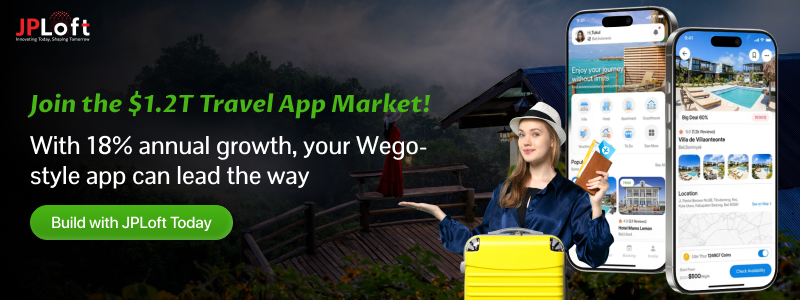
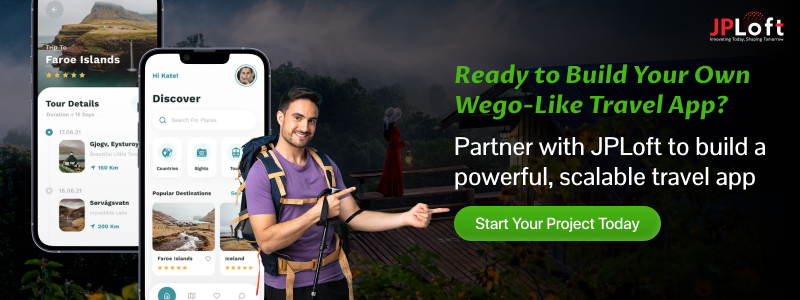

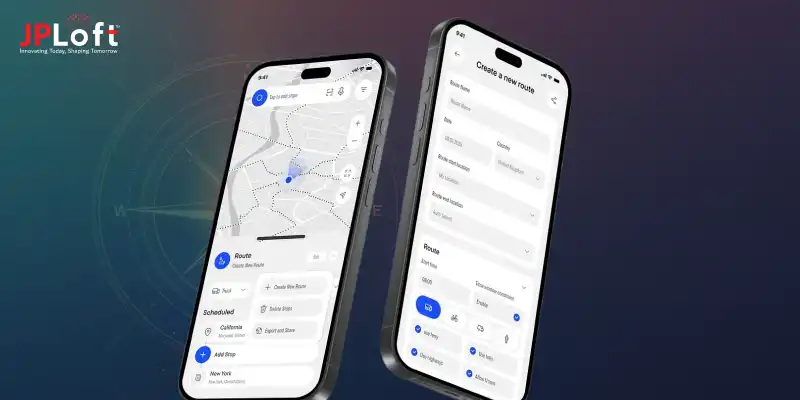
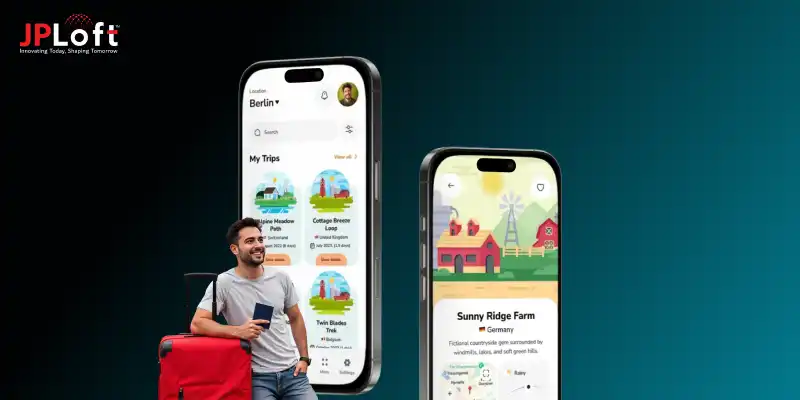
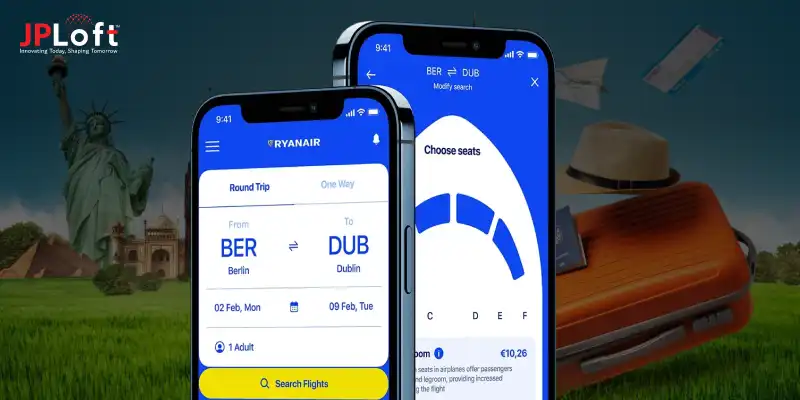


Share this blog